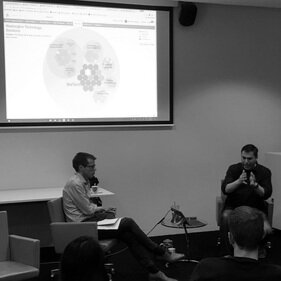"Holacracy allows me to treat people like adults" Michael DeAngelo
On Monday, engineers from the City of Amsterdam were offered a unique opportunity to learn from Michael DeAngelo, who leads the Holacracy experiment at Washington Technology Solutions. WaTech is the shared service center for the state of Washington, home to tech giants like Microsoft, Amazon, and Boeing, which makes it one of the world’s most important tech hubs.
Michael showed us WaTech's current governance, which is open to the public (link)
Attracting talent in these places means making opportunities stand out against some of the most attractive and well-paid jobs of today. Exactly this challenge drove Michael, deputy director, to look for ways in which WaTech could turn public service work an equal alternative. Research on career attractiveness showed that for ±80% of today’s workforce autonomy was an important driver in choosing an employer.
At the same time, Michael learned about Holacracy from a local tech start-up and, although the ‘remember me’ post-it sat on his computer for over a month, he instantly felt it could allow him to ‘organize autonomy’ at WaTech. After several months of piloting with one team, WaTech started an experiment with 150 participants and support from Harvard University to measure the impact of a control group.
At this moment, even though the quantitative data is still lacking, WaTech has already decided to entirely approve Holacracy as an equivalent to the management hierarchy, meaning any team is free to use Holacracy or not. The impact WaTech was able to measure is mainly operational: decision speed went from 20 down to 2 minutes. On the governance side, surveys show employees experience higher empowerment (up from 60% to 90%) and indicate a higher intent to stay. It’s too early to say whether the latter holds true in practice, but it’s definitely a promising step up.
From his experience Michael was able to share many challenges and conclusions, the most insightful ones being:
Did all teams make a successful power shift? “Some did not: the key enabler here is the type of leadership practised by the (former) manager, more so than the age.”
Did Holacracy make you more efficient? “For two circles it was decided not to hire generalists after managers left the company. One circle indicated they could do without and rather hire a specialist to add specific skills. The other circle still has a vacancy…” and “Before implementing Holacracy, I spent 80% of my time on ‘other’ stuff that required my manager input, now I spend 80% on content related material.”
Does Holacracy take extra time? “Technically, it does: Operational meetings replaced our regular meetings, so Governance is extra. At first, we spent considerable time here, but one year on governance is no issue anymore: we just do it.”
Do you find it harder to speak about careers (and underperformance) with employees? “Holacracy allows me to treat people like adults.”

